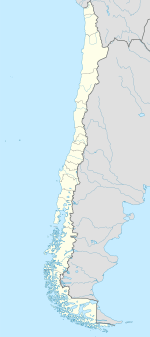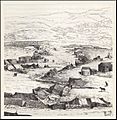Caracoles facts for kids
| Location | |
|---|---|
| Antofagasta Region | |
| Country | Chile |
| Coordinates | 23°2′19.42″S 69°0′20.33″W / 23.0387278°S 69.0056472°W |
| Production | |
| Products | Silver |
| History | |
| Opened | 1870 |
Caracoles was an important silver mining area. It is located in what is now the Antofagasta Region of Chile. When it was officially found in 1870, this area was part of Bolivia.
The rich silver deposits at Caracoles were discovered on March 24, 1870. A team of Chilean explorers found them. This team was led by José Díaz Gana and had traveled from the port city of Antofagasta. Soon after, Chilean money and miners helped to dig out the silver. Caracoles was the last big discovery during the Chilean silver rush. Some old miners believed it was found much earlier, around 1811. They thought two men from Aragon discovered it while trying to escape during the independence period. But then, people forgot where the silver was located.
The Caracoles site grew very quickly. In 1870, it was just a few simple shelters and huts. By 1871, it had become a small village. The settlement kept growing and soon had thousands of people living there.
A Border Dispute
The exact location of Caracoles caused a disagreement. This was between the governments of Bolivia and Chile. An earlier agreement, the Boundary Treaty of 1866 between Chile and Bolivia, said that money from taxes in the region between 23°S and 25°S latitude should be shared equally.
Talks were held to solve this problem. They led to the Corral-Lindsay agreement. However, Bolivia did not approve this agreement. Later, both countries signed the Boundary Treaty of 1874 between Chile and Bolivia. This new treaty removed the "Mutual Benefits Zone" where tax money was shared.
The Mine's Decline
Mining at Caracoles started to slow down in the mid-1870s. This happened for a few reasons. The richest silver ores were becoming used up. Also, the international price of silver began to fall.
Another challenge for Caracoles was its distance from the coast. It was far from the ports, which made it harder and more expensive to transport the silver. This also contributed to its economic problems.
After the War
After the War of the Pacific in 1879, Chile took control of the area. The town of Caracoles was then made the main city of the Caracoles Department. This department was part of Antofagasta Province. By the 1950s, most of the settlements around the mines were empty and in ruins.
Gallery
-
Map of Antofagasta Province in 1895. Caracoles is marked out east of Mejillones and south of Calama.
See also
 In Spanish: Mineral de Caracoles para niños
In Spanish: Mineral de Caracoles para niños
 | Sharif Bey |
 | Hale Woodruff |
 | Richmond Barthé |
 | Purvis Young |




